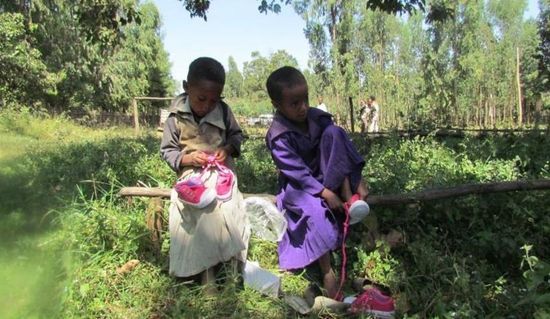
Podoconiosis is a non-infectious tropical disease characterized by steadily progressive foot and leg swelling (lymphoedema). It is commonly confused with lymphatic filariasis.
Skin diseases in general are very common, accounting for between 10 and 30% of all health worker-patient encounters. Therefore, while the skin may provide an entry point for the recognition of skin Neglected Tropical Diseases (NTDs), it is also the diagnostic point of focus for other common conditions representing both a huge disease burden in impoverished populations and important differential diagnoses.
Photo credit: W. Enbiale
Langue: English
Podoconiosis
Informations sur le cours
This course is available in the following languages:
Overview: Podoconiosis is an important disease in some countries where it should be considered in the differential diagnosis of lymphoedema due to lymphatic flilariasis, onchocerciasis, leprosy and protein-energy malnutrition in children. Management of podoconiosis is included in the morbidity management of lymphatic filariasis (LF) and is addressed by the WHO under LF prevention and control. This course aims at providing health workers with the basic knowledge to understand the epidemiology, diagnosis, treatment, impact and reporting of this important disease.
Learning objectives: By the end of this course, you should be able to:
- Understand epidemiology of podoconiosis at national and district levels;
- Describe the clinical aspects of podoconiosis;
- Understand how the diagnosis is made;
- Explain how to manage lymphoedema; and
- List how the recording and reporting of the disease is done.
Course duration: Approximately 1 hour.
Certificates: A Record of Achievement certificate will be available to participants who score at least 80% in the final assessment. Participants who receive a Record of Achievement can also download an Open Badge for this course. Click here to learn how.
Contenu du cours
Introduction:
This introductory module gives an overview of Neglected Tropical Diseases, skin-NTDs and podoconiosis.Module 1: Epidemiology, psychosocial and economic impact:
By the end of this module, you should be able to: explain the underlaying factors triggering podoconiosis; explain the risk factors; describe the geographical distribution; and describe the age and gender distribution.Module 2: Diagnosis and treatment:
By the end of this module, you should be able to: describe the clinical and epidemiological clues; list the main conditions for differential diagnosis; describe how clinical diagnosis is made; explain how lymphoedema is managed; and how to counsel patients.Module 3: Impact. Implementation of public health intervention:
By the end of this module, you should be able to: describe public health interventions; and how to measure a successful impact to control it.Module 4: Recording and reporting:
By the end of this module, you should be able to: explain the case definitions; and list the main indicators.
Inscrivez-moi à ce cours
Certificate Requirements
- Obtenez un certificat de réussite en gagnant plus de 80% du nombre maximal de points pour la somme de toutes les tâches hebdomadaires.
- Obtenez un Open Badge en complétant le cours.